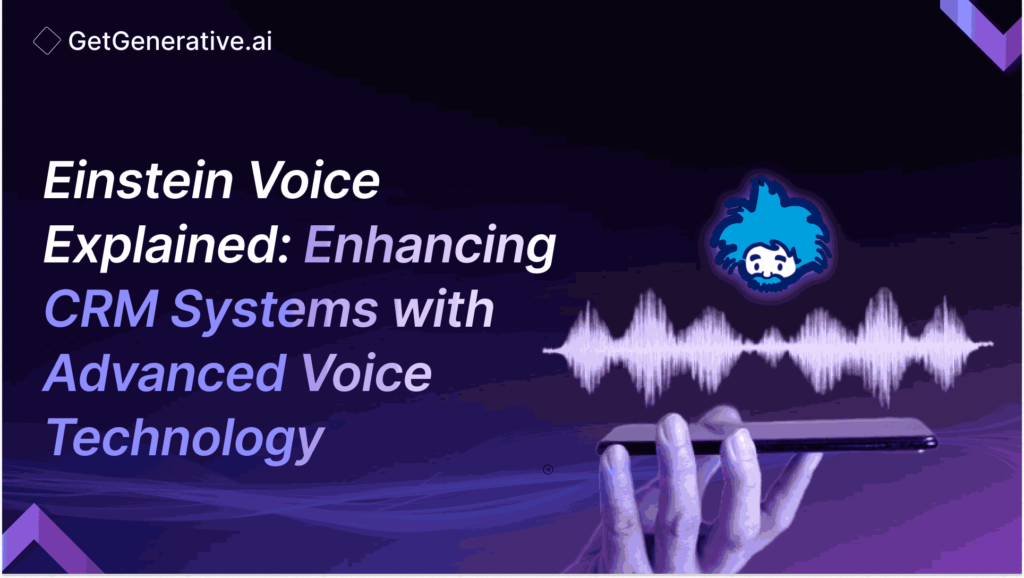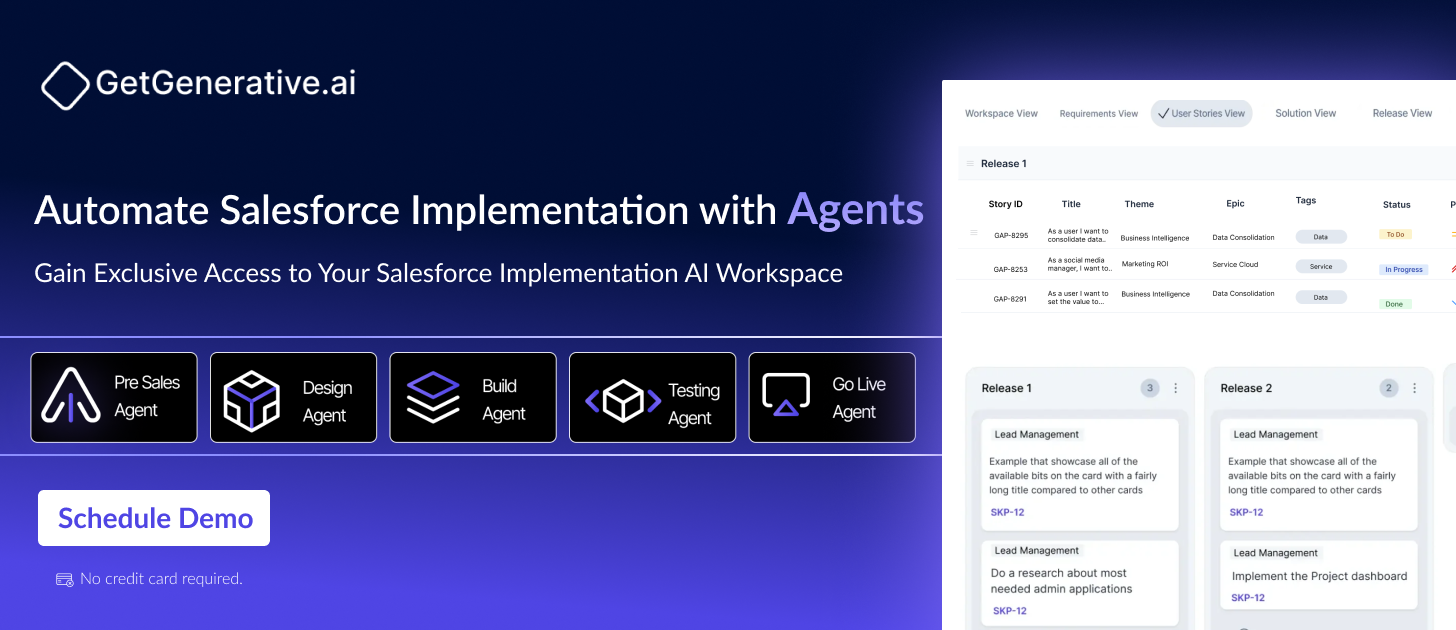Einstein Voice Explained: Enhancing CRM Systems With Advanced Voice Technology
Einstein Voice is a sophisticated feature developed by Salesforce that brings the power of voice technology to the Salesforce CRM platform. This tool enables users to interact with their CRM systems using natural language, making the software more accessible and easier to use. At its core, Einstein Voice uses advanced artificial intelligence to process and understand user commands, allowing for real-time updates, data retrieval, and analytics just by speaking.
Einstein Voice includes several specific functionalities that distinguish it from traditional data entry methods:
- Voice-Driven Data Entry: Users can speak directly to Salesforce to enter and update data across the platform. This can be as simple as updating a contact’s address or as detailed as logging interaction notes after a client meeting.
- Intelligent Data Interpretation: Beyond basic voice recognition, Einstein Voice analyzes the context of user commands. It understands the intent behind requests, enabling it to perform complex CRM tasks like initiating workflows or generating predictive analytics.
- Customizable Voice Bots: One of the most powerful features of Einstein Voice is the ability to create customized voice bots. These bots can be tailored to understand specific business terminologies and handle unique workflows, making them incredibly valuable for specialized business processes.
- Real-Time Dashboard Updates: Users can ask for reports and metrics through voice commands, and Einstein Voice will retrieve the information and update dashboards in real-time based on the latest data inputs.
How can Einstein Voice Improve CRM Efficiency?
The integration of Einstein Voice into CRM systems revolutionizes how businesses manage customer relationships by significantly enhancing operational efficiency. Here are some specific ways in which Einstein Voice contributes to more effective CRM usage:
- Real-Time Updates and Streamlined Data Management: Einstein Voice lets users update and retrieve CRM data in real time. For instance, a sales representative can update a customer’s information immediately after a meeting using a simple voice command, such as “Update customer John Doe’s phone number to 1234567890.” This capability reduces the backlog of data entry tasks and ensures that the CRM system always has the most current information.
- Increased Productivity on the Go: With mobile integration, Einstein Voice supports professionals who need to manage their CRM tasks away from the desk. This is particularly beneficial for sales teams and field agents who can dictate new data into the system or retrieve client information hands-free, maximizing their efficiency during travel or when visiting clients.
- Improved Accuracy and Data Integrity: Voice commands can help minimize human error associated with manual data entry. Since updates are made instantly and can be cross-verified through voice playback, errors are less likely, ensuring higher data integrity.
- Enhanced User Adoption and Accessibility: By simplifying the interaction with the CRM system, Einstein Voice can lead to higher user adoption rates. It makes the CRM system more accessible, especially for those who may be less tech-savvy or find traditional interfaces challenging. This ease of use translates to broader utilization across a company’s workforce.
- Time Efficiency and Cost Savings: Einstein Voice significantly reduces the time spent navigating complex menus and manually inputting data. Reducing repetitive administrative tasks allows employees to devote more time to customer service, strategy, and other high-value activities, leading to cost savings and better resource allocation.
- Customizable User Experiences: Businesses can configure Einstein Voice to meet specific needs and preferences by creating tailored voice bots that align with company terminology and processes. This customization ensures that voice commands align more with individual business models and workflows, further enhancing productivity.
Also Read – Einstein Discovery: Salesforce AI Tool for Transformative Data Insights
“Generative AI has the potential to change the world in ways that we can’t even imagine. It has the power to create new ideas, products, and services that will make our lives easier, more productive, and more creative.”
– Bill Gates, Co-Founder of Microsoft
Discussing the Capabilities of Einstein Voice
Here’s a deeper look at what Einstein Voice can do:
- Voice-Activated Record Updates: Users can effortlessly update any Salesforce record using their voice. For example, after a client meeting, a user could say, “Log a new activity for Project X, met with the client regarding Q3 deliverables.” Einstein Voice processes this instruction, updates the appropriate project records, and logs the meeting details without manual data entry.
- Dynamic Dashboard Interaction: With Einstein Voice, dashboards become more interactive. Users can ask for specific data points, like “Show me the current sales pipeline,” or request changes to what’s displayed, such as “Compare this year’s sales with last year.” This capability makes navigating complex data sets easier and more intuitive.
- Creation of Custom Voice Bots: Organizations can build customized voice bots tailored to specific operational needs or industry requirements. These bots can be programmed to understand and execute industry-specific commands, offer personalized responses, and interact with users in a way that mirrors natural conversation, greatly enhancing the user experience.
- Comprehensive Navigation Capabilities: Einstein Voice allows users to navigate the Salesforce CRM environment beyond simple queries and updates. Users can open specific modules, initiate tasks, and even set reminders via voice. For example, a user could say, “Open the lead list for this month and highlight leads with no follow-up action.”
- Seamless Integration with Analytics: Einstein Voice is integrated with Salesforce’s powerful AI, Einstein Analytics. This integration allows users to access analytics reports through voice and receive predictive insights and recommendations. For instance, a user could ask, “What are the predicted sales for the next quarter?” and receive an AI-driven forecast.
- Hands-Free Data Querying: This feature enables users to conduct complex data inquiries hands-free, particularly during meetings or presentations. Users can ask detailed questions about data, such as “What were the total sales by region for the last quarter?” and receive spoken answers directly from Salesforce.
Also Read – Salesforce Einstein Intent: A Comprehensive Guide
Potential Advancements in Voice Technology Within CRM Platforms
As voice technology continues to mature, its integration with CRM platforms like Salesforce is expected to evolve, introducing more sophisticated features that enhance user experience and business processes. Here are some of the potential advancements we might see shortly:
- Deep Learning Enhancements: Future iterations of voice technology in CRM systems could leverage deeper machine learning algorithms to understand better user intent, context, and subtleties in speech. This advancement would make voice commands more nuanced and complex, enabling users to execute multi-step processes or receive more detailed insights through simple verbal instructions.
- Voice Biometrics for Security: As voice technology becomes more prevalent in CRM systems, enhancing security measures will be crucial. One potential advancement is using voice biometrics to verify users’ identities. This would ensure that voice commands for sensitive operations, like accessing confidential data or performing significant transactional changes, are executed only by authorized personnel.
- Cross-Platform Integration: Future developments may enable seamless voice interaction across various platforms and devices without losing context. For example, users could start a task on their mobile device using voice commands and seamlessly continue on their desktop CRM application without interruptions or repeated commands.
- Emotion and Sentiment Analysis: Advancements in natural language processing allow voice technologies to analyze user interactions’ tone, sentiment, and emotional context. This capability would enable CRM systems to provide more personalized responses and services based on the user’s mood and vocal cues, enhancing customer service and support.
- Predictive Voice Analytics: Integrating predictive analytics with voice interactions could significantly enhance decision-making processes. For instance, as a user discusses sales forecasts or customer trends, the system could automatically provide predictive insights and recommendations based on the ongoing conversation, essentially participating in strategic meetings as an active, data-informed participant.
- Multilingual and Accent Adaptation: As businesses operate globally, voice technology must handle multiple languages and accents effectively. Future advancements may improve the system’s ability to understand and respond accurately to a diverse range of spoken inputs, making the technology accessible to a broader user base.
- Voice-Activated Workflow Automation: We might see CRM systems that allow complete workflow automation through voice commands. Users could set up, modify, and monitor workflows and processes using voice, making it easier to manage complex sequences of tasks and collaborate across teams without being tied down to manual inputs.
Also, Read – Top Salesforce AI Tools 2025 – The Ultimate List
Conclusion
Einstein Voice transforms CRM management by making data handling tasks faster, easier, and more intuitive. As businesses seek efficiency and enhanced customer experiences, integrating sophisticated voice technology like Einstein Voice into CRM platforms is beneficial and necessary.
Explore GetGenerative.ai today and start crafting impressive proposals quickly. Streamline your process and focus more on what truly matters. This tool is perfect for Salesforce consultants eager to boost their performance and efficiency.
Act Now—Elevate Your Salesforce Expertise with GetGenerative.ai!
Frequently Asked Questions (FAQs)
1. Is Einstein Voice available in all Salesforce editions?
Einstein Voice capabilities are generally available in most Salesforce editions but may require specific setup or additional licensing.
2. Can Einstein Voice understand different accents and dialects?
While Salesforce continuously works on improving speech recognition in Einstein Voice to handle various accents and dialects effectively, some users might experience variations in recognition accuracy.
3. How secure is it to use voice commands in CRM?
Salesforce applies robust security measures to protect all data interactions, including those made via voice commands. However, organizations should ensure that sensitive data is handled according to security policies.
4. Can Einstein Voice be integrated with other business systems?
Yes, Einstein Voice can be integrated with other business systems through Salesforce’s extensive API network, allowing for broader automation and data exchange capabilities.
5. What training is required to use Einstein Voice effectively?
Basic training on how to activate and use voice commands is generally sufficient. Salesforce provides resources and support to help users get acquainted with the functionality.




